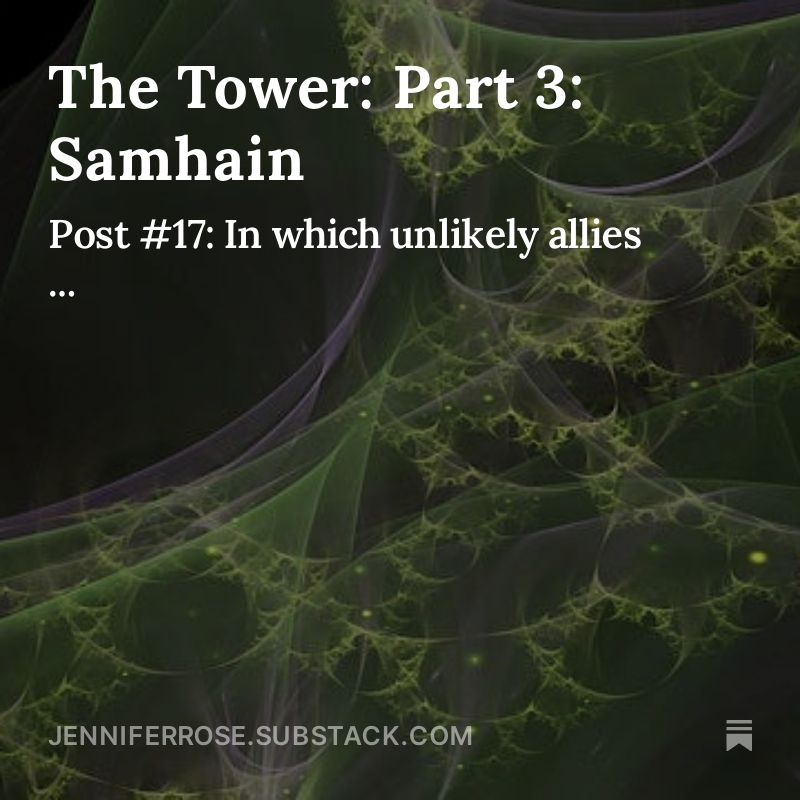by Jenny Rose | May 11, 2024 | Connection & Community, Emotional Intelligence, Shadows
… and she met a bear. She froze, watching it watching her, seeing the long claws, the muzzle raised to sniff the air, the marvelous deep pelt. She thought about everything she’d ever heard about dealing with bears. She stood still, attempting to convey the energy of no-harm.
The bear let out a “whuff” of breath, turned, and shambled away.
THE END
Once upon a time a woman walked through the woods and met a man she did not know. He made no eye contact, said nothing, and walked on. The woman followed his lead and ignored him, continuing on her way in a direction well away from his. She was conscious of a new alertness, a slight acceleration in her pulse. Her peaceful walk, her gratitude and appreciation of the balm of nature, her healing solitude, now took on the aspect of carelessness and risk. She knew some would say she was asking for trouble to walk in the woods alone. Was her comfortable clothing provocative? Were her jeans too tight? Did they send a signal that she wanted sex? Where, exactly, was she? If she called for help, could she be found quickly? Was she sure what direction she was walking in? She didn’t want to catch up to the man, didn’t want him to think she was following him or trying to get his attention. She didn’t want to linger in case he’d doubled back and was behind her. How fast was too fast? How slow was too slow? What was the fastest way back to her car?
She stopped, hesitating, sheltering behind a thick tree. Maybe the man was harmless. Maybe he had come to be alone and quiet, too. Maybe he’d hardly noticed her. Maybe he was a good man like her brother, her friends.
Maybe he was parked near her car and would wait for her to come out of the woods …
TO BE CONTINUED
Once upon a time a woman walked through the woods and met a man she didn’t know. He made eye contact with her, smiled, said, “How are you?”
The woman made her face smooth and calm, but inside she shrank and adrenaline kicked through her. Should she smile? She’d been told not to smile at strange men, lest it be misread. Should she reply to his greeting? Should she walk on without acknowledging him, or would that make him mad? Or hurt his feelings? (Probably he was a perfectly nice, harmless man.) Did she have anything she could use as a weapon? She’d seen no other cars when she parked; was anyone within earshot?
Her thoughts raced. Her steps slowed while she considered what to do. She smiled slightly without meeting his eyes. She didn’t speak and didn’t stop. As she walked away, she listened for sounds of him behind her, but all she could hear was the hammering of her heart. She didn’t dare look over her shoulder in case he was behind her and took it as encouragement. She felt naked. Were her jeans too tight? She wanted to take off her jacket and tie it around her waist, but she didn’t want to do anything to make him think she was afraid of him. She forced herself not to run. She lengthened her stride, standing tall, trying to project assertiveness.
She began to circle widely, back to where she’d parked her car …
TO BE CONTINUED

Photo by freestocks.org on Unsplash
I’m not on TikTok (God forbid), but I’ve been hearing about a recent viral sensation around the question of whether, as a woman, we’d rather meet a bear in the woods or a strange man. The vast majority of women would much prefer to meet a bear. The question was posed to me with no context and I didn’t need any time to think about it. I’d rather meet a bear, of course. A bear isn’t going to rape me. Bears don’t carry guns, abduct women, or hurt women for pleasure. I’ve often had brief interactions with black bears, both here in Maine and in Colorado. I’m not food. Any food I’m carrying can be tossed aside. As long as I don’t inadvertently get between a mom and her cubs, I’m not a threat, not something that needs to be attacked. If I am attacked and mauled, I’d far rather be hurt that way, or even killed, than fall into the hands of a twisted man. Bears are predictable. They don’t stalk, torture, lie, manipulate, kidnap, use substance, or terrorize for the fun of it.
A man might do anything.
A bear would recognize me as a human being. A man might not.
I’m told there’s a lot of anger from men about this answer, to which women respond with, “Thanks for illustrating the point so well. See? That anger, that language, that defensiveness and denial are exactly why we’d rather meet a bear than a man.”
And around and around we go.
Interestingly, an article I found that talked about this said when a man was asked if he’d rather his daughter met a bear or a man while walking alone in the woods, he eventually chose a bear.
I think about these things more than I have in years. I think about them every day at work, where I interact with all kinds of people as a professional, and every day as I walk the few blocks to and from work. I’m angry about it, because I assumed by the time I was 60 this sort of thing would be behind me. I forget this kind of behavior and threat really has nothing to do with my age and attractiveness; merely being a female is enough. For some men.

Photo by Sam Burriss on Unsplash
There’s no point is saying “not all men” because everyone knows that. Of course not all men are a threat to women; that’s not the point. The point is all men might be a threat and women can’t tell. We have to assume “all men,” for our own safety until we’re satisfied the man we’re interacting with is OK. Sadly, we’re often wrong. The vast majority of male violence against women and children is perpetrated by someone known, either a close connection or an acquaintance.
Men close to me who I trust have told me I’m “too nice.” I’m too warm. I’m too empathic. It’s infuriating. All my life I’ve worked with people. I like people (mostly). It doesn’t occur to me commiserating with a (overweight, completely unattractive, past middle-age old hippie with six strands of hair in a ponytail) patron over chronic back pain (beer belly) could possibly be seen as a come-on, an invitation to flirt and step over boundaries. Until it happens. And then I’m furious with myself, with him, with a world where a 60-year-old female lifeguard can’t say, “Jeez, sorry about your bad back,” to a male patron without having to spend the next month acting like a stone-cold bitch in order to reclaim boundaries.
It’s exhausting, and nearly impossible to explain to a man. It’s simply not in their experience and most of them can’t imagine living this way. But every woman knows exactly what I’m talking about. The divide between women and men gets deeper and deeper, fills with resentment and even hatred, because some men can’t or won’t understand our reality. It breaks my heart. Healthy men and women need one another. I don’t think we can effectively address the problem of male violence against women and children without healthy men.
I’m also thinking about this because we’re about to embark upon a major remodeling project in our home, which means we’ll have some months of workmen coming and going. I like men and I love watching men at work, learning about structure and building, observing, chatting. I would also like to occasionally make cookies or muffins, buy pizzas, and find other ways to show appreciation for the hard and expert work these guys will do. I want to communicate clearly and assertively with the contractor to make sure we’re on the same page and we understand one another’s expectations. I want to make healthy, respectful professional connections.
But I’ll probably let my male partner do most of the interfacing. He’s the one at home all the time anyway. It’s safer for him. I will connect with the contractor and write checks, but otherwise I’ll make myself small, stay out of the way, and try not to attract attention, including refraining from expressing “too much” gratitude or warmth. Whatever the hell that means.
It makes me sad. This is a big adventure for us. I’d like to have fun, embrace the chaos and change, enjoy the process and get to know the people who are making it possible. But the risk is too great.
This bear versus man viral question is important because of the spotlight it shines on female experience. Instead of an opportunity for further male outrage and denial or stoking more hatred for men among women, it could be a moment to foster a better understanding of the experience of having to live defensively every single day as a woman, knowing even that may not save us from male violence, and if we do fall victim to male violence, we’ll be blamed for it. (Our jeans were probably too tight. Or we shouldn’t have been walking alone.)
Or we could just go talk to the bears.
Questions for women:
- Would you rather meet a man you don’t know or a bear while walking alone in the woods?
- When a strange man is friendly with you in person (and you’re not looking for a date or a lay), what do you do?
- What do you routinely do in an effort to avoid male violence?
Leave a comment below!
To read my fiction, serially published free every week, go here: 
by Jenny Rose | Aug 16, 2018 | Power

Photo by Anna Dziubinska on Unsplash
It’s easy these days to feel overwhelmed and despairing. Life is increasingly unpredictable and the future uncertain socially, economically and in terms of climate. We’ve never before been able to discuss so many issues with so many others, or been exposed to so many different sources of information and opinions. As our public education system flounders, fewer and fewer people think critically, which is daily becoming a more important tool in navigating our information overload.
I heard about a comment the other day on social media directed toward someone discussing women’s rights. The man commenting asked why we’re talking about something like feminism when climate change is so pressing. Why are we wasting energy on women’s rights while the planet is getting more and more difficult to inhabit, not in some hazy future but right now, today?

Photo by Nicole Mason on Unsplash
That question points to the reason we find ourselves in our present situation in the first place. Our social struggles reflect our approach to living on and with our planet. The thinking shaping our social behavior is the same thinking shaping our behavior as citizens on Planet Earth. If we feel we’re entitled to rape, rob or otherwise seize power and control over another human being or group of human beings, we feel equally entitled to use the planet however we want, with no thought of anyone else or the consequences of our behavior. This fertile, life-giving planet is our mother. We live on her body. The degree to which we respect and appreciate her is the degree to which we afford the same treatment to women. It’s the same discussion. It’s not a coincidence that the increasing pressure on our physical survival is happening in the middle of the current social maelstrom.
I’m not a scientist, though I endeavor to be a critical thinker. However, I’ve done quite a bit of reading on the subject of complex systems and earth systems science, including Darwin’s Unfinished Business by Simon Powell, Animate Earth by Stephan Harding, Overshoot by William Catton and Gaia’s Revenge by James Lovelock. Everything I read confirms what I intuitively recognize.
Everything matters. Everyone matters. It’s all connected.
The days are gone when we can tell ourselves what happens on the other side of the world doesn’t affect us and we need not pay attention or worry about it. We have so far exceeded the earth’s carrying capacity for our species that the actions of each individual have an effect on the whole. As human population oozes and bulges into every biome all over the globe, we also directly affect every other form of life: Animal, plant, insect, fungi and microorganism. We displace other species, poison their habitat and compete fiercely for resources. We have no sense of our own needs or the needs of others, but focus on what we want, and we want it all — right now. We deserve it. We have a right to it.
Certain groups of men have no intention of sharing power, dignity and economic resources with women, let alone sharing the planet with fungi and Monarch butterflies. Some groups would eradicate cattle from the globe before learning how to integrate them back into the healthy complex system they were part of until we threw things out of balance with our numbers and ignorance. Others work to bar immigrants, saying they’ll take our jobs, they’ll soak up social resources and they’ll poison our communities with their foreign tongues and culture, too ignorant and short-sighted to grasp we are only enriched and strengthened by the presence of other cultures.
It’s all the same discussion. It’s all connected.

Photo by NASA on Unsplash
We are only now beginning to glimpse the miraculous web of life on Earth, only now getting a sense of Earth as a sentient complex system, self-regulating and self-sufficient, and the knowledge may have come too late. Complexity is life. Complexity is resilient and creates the ability to learn and adapt. Any behavior or ideology seeking to minimize, disrupt, or eradicate complexity is destructive. Those who work for purity, for homogenized patriotism, for the complete power of one religion, sex, diet, complexion, body type or expression of sexuality are actively tearing apart our world and our future.
Our inability to live peacefully and cooperatively with one another is our inability to respect and care for the land under our feet. Our willingness to tolerate slavery, sex trafficking and bureaucracy that destroys families, indigenous groups, human rights, reproductive choice and other natural resources is the same willingness to worship the false idol of money, buy whatever we want when we want it and discard it later with impunity. If we can’t buy what we want, we take it, or steal it. This is the definition of rape culture.
Complexity is about integration. One way to interpret the old stories is to consider each character as a separate part of the same psyche. In other words, we all have an innocent Red Riding Hood maiden inside us, and we all have an old bedridden grandparent, a parent who warns us of the dangers of leaving the path, a wily predator and a heroic figure who saves the day. A healthy adult learns to know and accept his or her shadow side, as well as more admirable characteristics. Spiritual wholeness consists of a well-balanced masculine and feminine, no matter our biological sex. If we are unable to integrate all these voices and archetypes, all these facets of personality, feelings and thoughts, and operate as a whole complex psyche, we’re crippled, and we’re certainly going to be unable to take our place as an effective, joyous and elegant part of the wider complex system of Planet Earth.
So yes, it matters. It matters if you use a plastic straw and throw it away. It matters if you toss your plastic cup out the car window. It matters if you support the tobacco industry because they’ve successfully addicted you. If you throw one less item away today, it matters. If you recycle and compost, it matters. If you stop rototilling your garden, which damages the soil, it matters. The way you treat the people and animals around you matters. We don’t have the power to stop or change the enormous transition we’re caught up in by ourselves. We may never see validation, recognition or negative consequences for the choices we make, but those choices do matter, because we’re all inextricably connected, like it or not, deny it or not.
Megastorms matter. Lead in drinking water and cancer clusters matter. Water conservation efforts in Cape Town matter. Antibiotic-resistant bacteria matter. Fires, earthquakes and volcanic activity matter.
People matter, too. Our experience, feelings and thoughts matter. I don’t matter more than you or anyone else, but, as a living creature on the planet, I matter. The way I treat myself matters. My health matters, and my creativity, and my ability to learn.

Photo by Gabriel Jimenez on Unsplash
If we can’t wrap our heads around the essential value and importance of each life, including our own, and support each individual in their personal power, we will absolutely destroy all non-human life on the planet and ourselves with it. If we’re really serious about equal rights, we need to learn to share our rapidly diminishing resources, and I don’t mean cars, technology and food delicacies grown half a world away. I don’t mean diamonds, designer clothing, private airplanes and yachts, and mansions housing a family of four. I mean basic food, clean water and habitable land. We each need to take responsibility for our addiction to instant gratification, convenience and all the latest tech, toys and trends. We need to let go of our entitlement and work together to create a sustainable standard of living for everyone.
So yes, food and water politics, sexual identity politics, human rights, healthcare, education, families and children and immigration all matter. They’re all road signs and mile markers. The question is whether we’ll travel in the direction of destruction or use these issues as opportunities to build bridges, enlarge our empathy and heal our disconnection from ourselves, from other humans, and from all other life, paving the way to managing climate change as elegantly as possible.
I know what direction I’m going in, not with hope of reaching some kind of utopia, but because it’s the only direction that makes any sense to me. Many, many people disagree with me, I know, and I’m going to have to fight the mob going in the direction of destruction. That’s okay. I never seem to be traveling in the direction of the majority, so I’m used to it, and there will be others going my way.
In the meantime, I walk the tightrope suspended over the paradox at the heart of modern life. I fight to maintain power and authority in my own life and use it for the greater good as well as my own benefit. At the same time, I acknowledge I am but one life among uncounted living beings on the planet, spinning through space with everyone else towards an uncertain future. My power is present, but limited. If I make even the smallest difference for good in my lifetime, I’ll probably never know, and no one else will ever see, and that’s okay with me.
It still matters.

Photo by Ivan Jevtic on Unsplash
All content on this site ©2018
Jennifer Rose
except where otherwise noted







